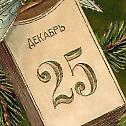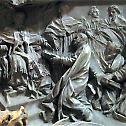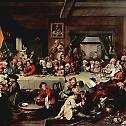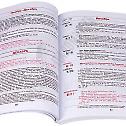Theology
Discourse on the day of the Baptism of Christ
19. January 2016 - 15:55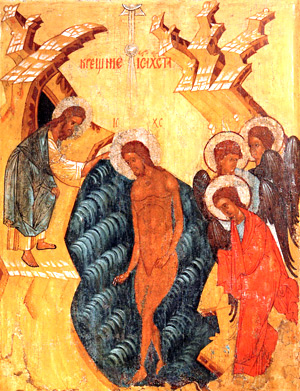 We shall now say something about the present feast. Many celebrate the feastdays and know their designations, but the cause for which they were established they know not. Thus concerning this, that the present feast is called Theophany—everyone knows; but what this is—Theophany, and whether it be one thing or another, they know not. And this is shameful—every year to celebrate the feastday and not know its reason.
We shall now say something about the present feast. Many celebrate the feastdays and know their designations, but the cause for which they were established they know not. Thus concerning this, that the present feast is called Theophany—everyone knows; but what this is—Theophany, and whether it be one thing or another, they know not. And this is shameful—every year to celebrate the feastday and not know its reason.
First of all therefore, it is necessary to say that there is not one Theophany, but two: the one actual, which already has occurred, and the second in future, which will happen with glory at the end of the world. About this one and about the other you will hear today from Paul, who in conversing with Titus, speaks thus about the present: The grace of God hath revealed itself, having saved all mankind, decreeing, that we reject iniquity and worldly desires, and dwell in the present age in prudence and in righteousness and piety—and about the future: Awaiting the blessed hope and glorious appearance of our great God and Saviour Jesus Christ (Tit 2:11-13). And a prophet speaks thus about this latter: The sun shalt turn to darkness, and the moon to blood at first, then shalt come the great and illuminating Day of the Lord (Joel 2:31).
Sermon by St John (Maximovich) on St Seraphim of Sarov
18. January 2016 - 13:18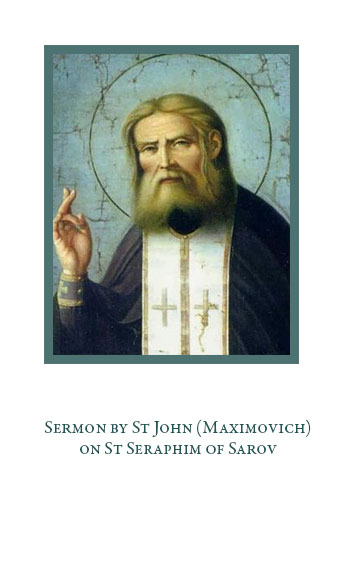 In the name of the Father, the Son, and the Holy Spirit!
In the name of the Father, the Son, and the Holy Spirit!
“They will sing Pascha in the summer,” they once said in Sarov. Seventy years passed from the death of the man about whom these words were pronounced, and on July 19, 1903, all of Rus’ resounded with hymns of praise, glorifying God and His saint. Truly, all of Rus’ exalted then as on the Day of Holy Pascha-even more so.
Terrible days were to come for Russia, but the memory of St Seraphim neither died nor weakened. Russian people continue to appeal to him and glorify him, both in the suffering Homeland and throughout the ends of the world where they are scattered. Even other nations are becoming familiar with St Seraphim; his Life (biography) is being translated into various languages, evoking not only admiration, but also, in many, the striving to apply in their own lives the lessons given to us by his life. Thus, despite the changes that have taken place in the world, the memory of St Seraphim not only does not fade, but it remains a lamp that shines ever brighter to humanity.
Weekly Diocesan Bulletin - Sunday, January 17, 2016
15. January 2016 - 12:0133rd Sunday after Pentecost: Sunday before Theophany; Synaxis of the Seventy Apostles; Saint Eustasius I, Archbishop of Serbia
RESURRECTIONAL TROPARION - TONE EIGHT:
You descended from on high, O Merciful One! You accepted the three day burial to free us from our sufferings! O Lord, our Life and Resurrection: Glory to You!
On the Julian calendar, church tradition, and standing for the Faith
10. January 2016 - 13:45Christmas and New Year is a time when many Orthodox Christians who follow the Julian (old) calendar wonder why they do so; or rather, those who follow the Gregorian (new) calendar wonder why the old calendar Churches don’t want to change. Here is another thorough look at this question, from a number of angles.
* * *
Lately the question often arises: Why does the Russian Orthodox Church live by the Julian calendar when the whole world and the majority of Orthodox Local Churches have long since changed to the Gregorian calendar? And really, why? How cogent are the arguments against the old calendar? How is the calendar connected with our Christian spiritual life, and what is the significance of preserving our traditions in the modern world? Historian Pavel Kuznekov talks with our readers on this subject.
Weekly Diocesan Bulletin - Sunday, January 10, 2016
7. January 2016 - 13:06 32nd Sunday after Pentecost:
32nd Sunday after Pentecost:
The Holy and Righteous Prophet and King David, Joseph the betrothed, and James the Brother of the Lord; The 20,000 Holy Martyrs of Nicomedia
RESURRECTIONAL TROPARION - TONE SEVEN:
By Your Cross, You destroyed death! To the thief, You opened Paradise! For the myrrhbearers, You changed weeping into joy! And You commanded Your disciples, O Christ God, to proclaim that You are risen, granting the world great mercy!
The Nativity sermon of St. John Chrysostom
6. January 2016 - 18:29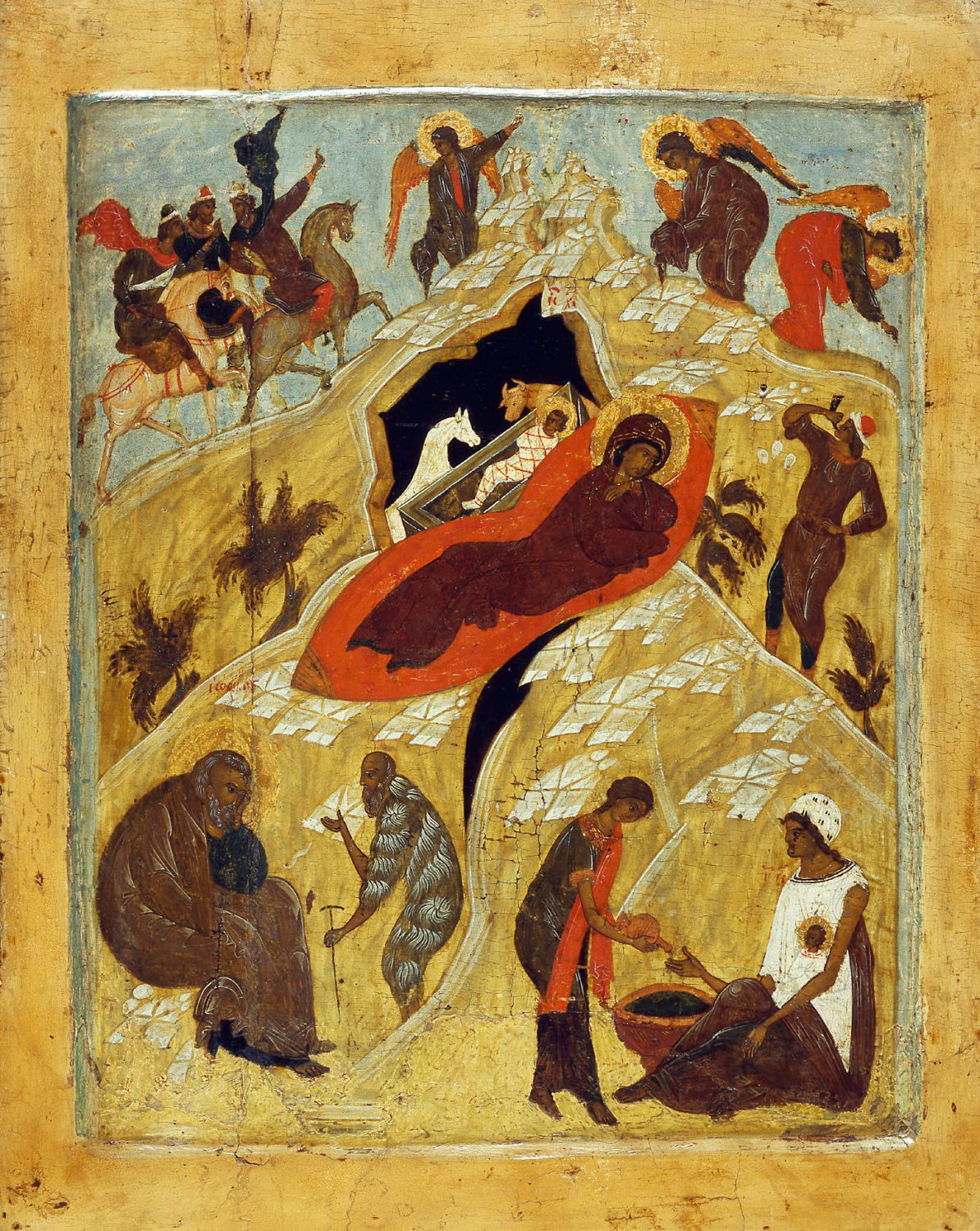 BEHOLD a new and wondrous mystery.
BEHOLD a new and wondrous mystery.
My ears resound to the Shepherd’s song, piping no soft melody, but chanting full forth a heavenly hymn. The Angels sing. The Archangels blend their voice in harmony. The Cherubim hymn their joyful praise. The Seraphim exalt His glory. All join to praise this holy feast, beholding the Godhead here on earth, and man in heaven. He Who is above, now for our redemption dwells here below; and he that was lowly is by divine mercy raised.
Bethlehem this day resembles heaven; hearing from the stars the singing of angelic voices; and in place of the sun, enfolds within itself on every side, the Sun of justice. And ask not how: for where God wills, the order of nature yields. For He willed; He had the power; He descended; He redeemed; all things yielded in obedience to God. This day He Who is, is Born; and He Who is, becomes what He was not. For when He was God, He became man; yet not departing from the Godhead that is His. Nor yet by any loss of divinity became He man, nor through increase became He God from man; but being the Word He became flesh, His nature, because of impassability, remaining unchanged.

